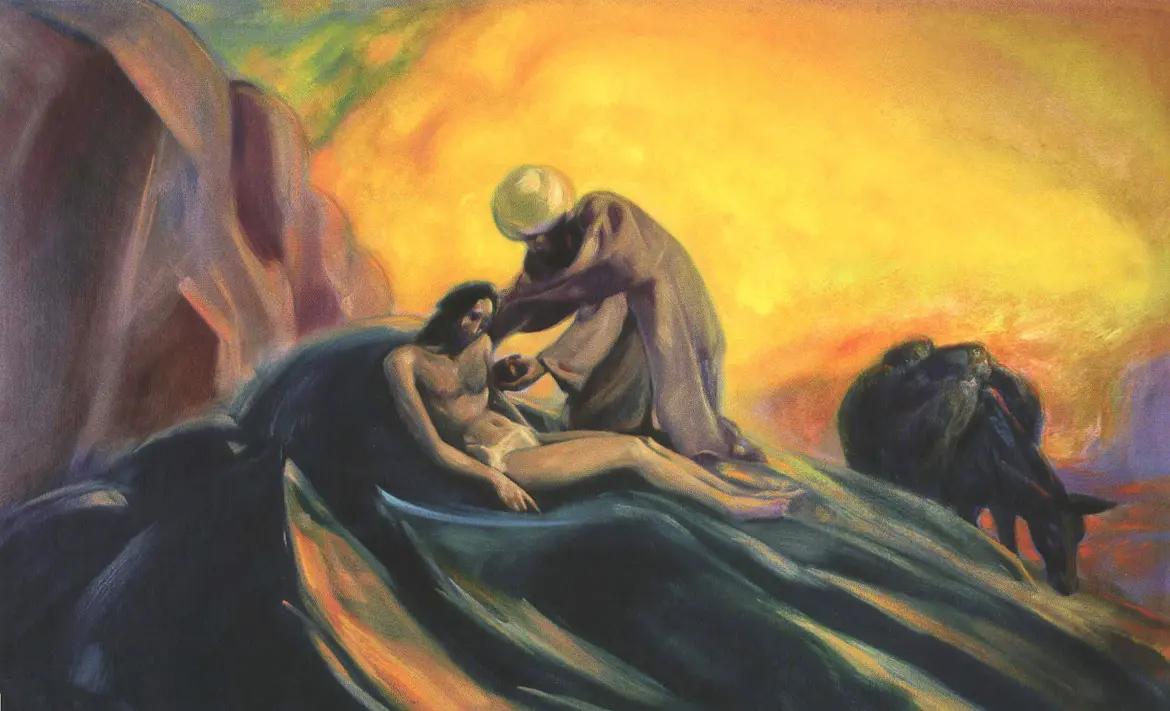

For many of us, Christian or not, being good is the best thing we can be. Many ask: ” Am I a good person?” and for some it is a relief and compliment to hear ” You are a good person.”
I often hear that a good person is someone who knows the difference between good and evil. But it occurs to me that knowing that difference is exactly what brought death into the world.
Genesis 2: 16 And the Lord God commanded the man, “You are free to eat from any tree in the garden; 17 but you must not eat from the tree of the knowledge of good and evil, for when you eat from it you will certainly die.”
Genesis 3: 4 “You will not certainly die,” the serpent said to the woman. 5 “For God knows that when you eat from it your eyes will be opened, and you will be like God, knowing good and evil.”
The whole world was declared as Good by God. What must have happened to the world and to humans when we began to function and exist in terms of good and evil?
We are also challenged in our idea of goodness by the teaching of Jesus. In three of the Gospels Jesus says ” No-one is good but God.”
Matthew 19:17, Mark 10:18, Luke 18:19
I learned the word “good” used in these scriptures is agathon or agathos which means ‘intrinsically good’, ‘good in nature’, good whether it be seen or not. Aristotle taught about the necessity of this sort of goodness. but Jesus tells us that no-one is good in this way but God..
But then there is Paul who describes Goodness as a characteristic of the Fruit of the Spirit. So in the light of what Jesus tells us, how is it possible to manifest the fruit of the spirit, goodness?
The word Paul uses for ‘goodness’ in Galatians is agathōsynē which does not appear at all in secular Greek papyri; it is strictly a Biblical term. It means ‘goodness which comes from God.’ So, when goodness manifests in our lives, it is something that flows as a result of God’s Spirit into the world from within us and in concert with the other fruit of the Spirit. Each of the Fruit of the Spirit is connected to the others. We cannot practice Goodness unless we are also practicing kindness, gentleness, patience, self control, joy, faithfulness, love and peace.
It helps me understand why so much evil is done in the name of good. Outside of the companionship of all of the Fruit of the Spirit, Goodness is no longer that. If we identify ourselves as ‘good’ we tend to identify that which is different to us as ‘evil. ‘ People have justified a lot of horrible actions in the name of being the ‘good fighting against evil.’
So how are we to identify ourselves, if not by goodness?
The story of the Good Samaritan cuts right through this pervasive idea of the superiority of goodness. In the Samaritan story those who have identified themselves as ‘good’ avoid the brokenness of the human being in their path. He is ‘other.’ The Samaritan acted with mercy, with compassion, with kindness. He becomes an example of what Jesus describes as God’s perfection: “…but I say unto you, Love your enemies, and pray for them that persecute you; that you may be children of your Father in heaven. He causes his sun to rise on the evil and the good, and sends rain on the righteous and the unrighteous.”
Jesus bypasses our expectation of being good and calls us to compassion. Understanding goodness this way is a tremendous relief to me. It sets us free from the pressure of being a ‘good person’ and helps me understand that Jesus has called us to something broader, gentler, deeper and much more in keeping with real life. We talk about Jesus setting us free from sin, death and evil, but perhaps even as importantly, Jesus has has also set us free from the pressure of being ‘good.’ In Mary Oliver’s poem ‘Wild Geese’ hear the same call to bypass the demand for goodness and instead seek relationship with each other, the earth and all of life.
Wild Geese
You do not have to be good.
You do not have to walk on your knees
for a hundred miles through the desert repenting.
You only have to let the soft animal of your body
love what it loves.
Tell me about despair, yours, and I will tell you mine.
Meanwhile the world goes on.
Meanwhile the sun and the clear pebbles of the rain
are moving across the landscapes,
over the prairies and the deep trees,
the mountains and the rivers.
Meanwhile the wild geese, high in the clean blue air,
are heading home again.
Whoever you are, no matter how lonely,
the world offers itself to your imagination,
calls to you like the wild geese, harsh and exciting –
over and over announcing your place
in the family of things.Mary Oliver
-----------------------------------------------------------------------------------------------------
Artwork
image: Svyatoslav Nikolaevich Roerich, Good Samaritan, 1943
